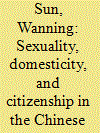| Srl | Item |
| 1 |
ID:
137927


|
|
|
|
|
| Summary/Abstract |
Over the past decade, growing numbers of young Filipinas have entered Denmark on the au pair scheme. While its official aim is to broaden the cultural horizons of youth, researchers generally view Filipina au pairing as a form of labour migration using au pairs as inexpensive domestic workers. This article argues that, despite this critique, au pairing does play an important formative role for young Filipinas because it opens up for experiences abroad that enable them to be recognised as independent adults in Philippine society. Rather than autonomy, however, au pairs define their independence in terms of their capacity to assume responsibility for others, thereby achieving a position of social respect. Based on ethnographic fieldwork in Denmark and the Philippines, this article explores how young Filipinas use the social, economic, and cultural resources they gain from their au pair stay abroad to re-position themselves vis-à-vis family and friends at home.
|
|
|
|
|
|
|
|
|
|
|
|
|
|
|
|
| 2 |
ID:
083207


|
|
|
|
|
| Publication |
2008.
|
| Summary/Abstract |
The widespread phenomenon of outsourcing domestic work has profoundly altered the household life styles of urban families and reworked the division of labor at home. However, the extent to which urban consumers depend on the labor and service provided by the rural migrant women is by no means indicative of the degree of "harmony" and civility between the two groups. While the Chinese news media, with its urban and middle-class clientele base, see little chance of selling pictures or headlines featuring the everyday struggles of disenfranchised social groups such as rural migrant women who are employed as domestic workers, they have exercised unprecedented freedom in publishing stories about criminality and sexuality. With the figure of the maid becoming increasingly ubiquitous in urban households, urban consumers of paid domestic work also get a regular dose of "maid stories" in their everyday media consumption. Combining ethnography with detailed media analyses, this article examines the range of gendered positions and modes of sexual subjectivity which have been articulated in these stories. It shows that in a number ways the emergence of a new sexual sensibility for urban, middle-class men is contingent on the exclusion of subject positions for, and the derogation of, the "other" woman-the "intimate stranger" at home.
|
|
|
|
|
|
|
|
|
|
|
|
|
|
|
|